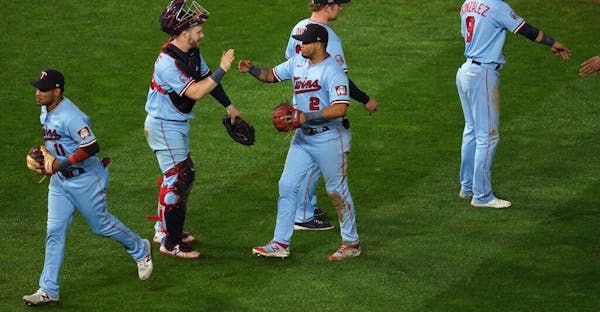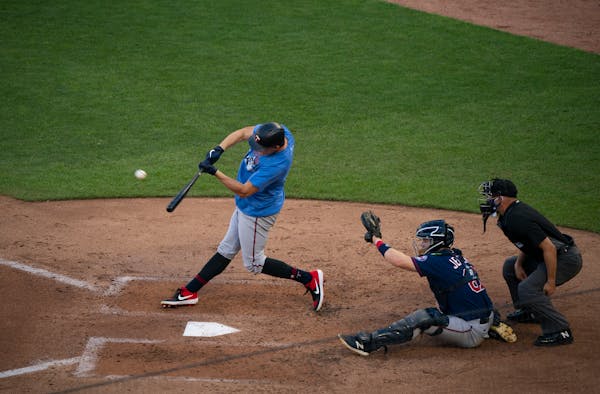A Twins hitter steps out of the box after taking the first pitch in his at-bat. As he does, the sound system starts blaring a song by Drake.
He takes the next pitch, steps out again, and now, behind the voice of Dick Bremer or Spanish-speaking Alfonso Fernandez on the broadcasts, you might hear 2 Chainz before he finally puts bat to ball.
There won't be just walk-up music at Target Field when fans tune in to Twins games. After seeing just how much silence there was without fans in the park during a recent scrimmage, the team will be pumping in songs from hitters' playlists throughout their entire at-bat.
"We're going to be able to play snippets of songs that resonate with them in between every pitch to get them kind of in that right headspace to hit the next pitch," said Chris Iles, Twins senior director of brand experience and innovation.
The at-bat music is one of several ways the in-game atmosphere, and by proxy, the experience of watching a game on television, will be different without fans in attendance.
Major League Soccer viewers have had a taste of what that's like on ESPN and Fox Sports 1. Those networks, along with FSN and the various teams and leagues, have all grappled with the same issue with varied answers — how to manufacture an atmosphere without a crowd to generate one, and how best to convey that over the airwaves.
Only now are those who work in sports realizing just how glued together sound and competition are.
For instance, as Iles said, "We were unprepared for the amount of music we were going to need to make the atmosphere be what it needs to be to create that home-field advantage."
Filling the silence
Not everyone is comfortable in complete silence.
It can be especially jarring in a baseball game, when players might expect a certain level of noise from tens of thousands of people surrounding them. Viewers have grown accustomed to a certain buzz in the background of a telecast. To alleviate these concerns, MLB has given each team an iPad with pre-programmed sounds to play from the makers of the video game MLB The Show.
Iles breaks the sounds down into three categories. The first is what the Twins are calling the "crowd bed" or a constant murmur to mimic that sound of a crowd.
"It's a general background hum that you don't know that you would miss until it's gone really," Isles said.
The second is anticipatory sounds.
"Imagine the sound a crowd makes if the ball is in the air and you're not sure if it's fair, foul or a home run or if it's going to be caught," Isles said.
The third category contains reaction sounds.
"It's a home run, the crowd loses their mind," Isles said. "Or it's an out and the crowd reacts with disappointment."
The Twins will have an audio engineer pushing the right buttons at the appropriate time.
Of course, those won't be the only sounds in the park. The music will be constant, as Iles said the Twins will shift from gearing their sound system for optimal fan enjoyment to trying to create a home-field advantage.
"At this point they're going to be the only people that are in the ballpark, which present really a unique and exciting opportunity to focus our efforts and be able to try some things we always wanted to try without fans in the stadium," Iles said.
On the broadcast end, FSN executive producer Tony Tortorici said the network will not be manufacturing any more crowd noise or reactions on top of what will come out through the sound system of Target Field or whatever stadium in which the Twins are playing. That goes for both the English and Spanish broadcasts, with the latter being FSN's feed but with Fernandez and Tony Oliva doing the commentary. Whatever comes through the cameras and microphones is what viewers will see.
"Our catcher's mitt is out and we will take what's in the stadium," Tortorici said.
It's the same stance ESPN adopted for its national broadcasts — no manufactured crowd noise except what's in the stadium. ESPN's senior vice president of production and remote events Mark Gross said the network learned from its broadcast of Korean baseball that "a little bit of crowd noise certainly goes a long way" in terms of broadcast quality. The "crowd bed" MLB is supplying teams should help with that.
"We are not looking to fool anybody," Gross said. "We realize there's no fans there, but by having a little crowd sound below the announcers just seems to make it work and doesn't sound quite so hollow when we are doing the games."
Beyond baseball
Tortorici said FSN will adopt the same stance with its Wild broadcasts — whatever is in the arena will come through the broadcast. The NHL expects to announce soon how it will generate an atmosphere during games. The NBA and WNBA have yet to announce the same.
ESPN and FS1 have taken slightly different stances when it comes to broadcasting MLS games.
FS1 has artificially added crowd noise to its broadcasts with an option to stream games online without the added noise. ESPN has added microphones around the stadium in Orlando to enhance the natural sounds of the game.
That brings up another feature you may overhear in various broadcasts: in-game chatter. Purists may love the chance to hear communication between teammates in each sport. But that comes with a few pratfalls. Teams may inadvertently reveal proprietary information, and that's something the crowd noise can help obscure. There also may be things said not suitable for broadcast.
"There's so much trash-talking that goes in those dugouts," ESPN analyst Alex Rodriguez said. "If you actually lower the volume and hear the players, I mean, there could be fights every day, but we can't fight because of social distancing. …
"But I think this could be a really big opportunity to hear the players. Again, the more we can reveal of the players and what kind of people they are and you hear the voice, you may get intrigued to learn more about them."
At least with the Twins, you are likely to learn a little bit more about their favorite music.
"These guys love music and to be able to hear their own music multiple times during an at-bat, I think that provides a psychological advantage for our team," Iles said.

Twins call up pitching prospect Travis Adams to bullpen

RandBall: Aaron Rodgers made up his mind, and not a minute too soon

Softball state tournament: Live updates from championship games at Jane Sage Cowles Stadium


